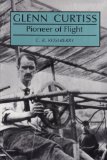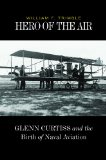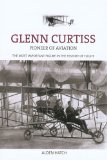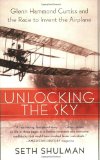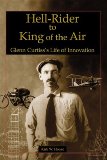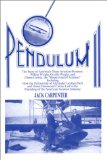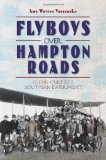Glenn
Curtiss, Pioneer of Flight
by Cecil R. Roseberry
Paperback Reprint edition (August 1991)
Syracuse Univ Pr (Trade); ISBN: 0815602642
Glenn
H. Curtiss : Aviation Pioneer
by Charles R. Mitchell, et al
Paperback - 128 pages
Arcadia; ISBN: 0738505196
The
Curtiss Hs Flying Boats (Profiles in Aeronautical History, Part 1)
by K. M. Molson, A. J. Shortt (Contributor)
Paperback: 147 pages
United States Naval Inst.; ISBN: 1557501424;
Unlocking
The Sky : Glenn Hammond Curtiss and the Race to Invent the Airplane
by Seth Shulman
In the American imagination, Wilbur and Orville Wright are "earnest,
young bicycle builders who attacked an age-old technological problem with
fresh, ingenious thinking and dedication." There is plenty of truth to
this, writes Seth Shulman, but it also obscures an important fact: The
first flyers were so secretive and desperate to cash in on their invention
that their behavior actually "retarded" the development of aviation. One
of their most brutish acts involved a punishing legal fight with Glenn
Hammond Curtiss, the inventor of the aileron (wing flaps that stabilize
an aircraft in flight), retractable landing gear, pontoons, and much else.
Unlocking the Sky suggests that Curtiss deserves at least near-equal billing
with the brothers from Dayton. He performed the first public flight in
the United States, sold the first commercial airplane, and piloted the
first flight from one American city to another. "Curtiss surely belongs
in the pantheon of America's greatest entrepreneurial inventors," writes
Shulman. Yet he's virtually forgotten today, except by aficionados of aviation
history. He comes across as a pioneering hero on these pages--and the Wright
brothers as thuggish would-be monopolizers. This may be revisionist history,
but it's a history that perhaps could stand revising. --John J. Miller
- Amazon.com
Hardcover from HarperCollins
Glenn Curtiss
Curtiss, Glenn Hammond (1878-1930), American aviator and inventor.
In 1907 (some sources say 1904) he rode a V8 powered motorcycle of
his own design to the previously unheard of speed of 136 mph on a Florida
beach, earning himself the title of "The fastest man alive". His involvement
in aviation began when he flew a Curtiss powered Baldwin airship solo without
any serious prior instruction. In 1907 he partnered with Alexander Grahame
Bell to form the Aerial Experiment Association, and made his first powered
flight on his 30th birthday, 21st May 1908, in White Wing.
In 1908 he won a prize for being the first for being first to fly in a
straight line for more than a kilometer. In 1909 he won the international
aviation meet at Reims, France, flying an airplane he had designed himself.
Curtiss designed and built a number of the earliest seaplanes and flying
boats. In 1919 his NC-4 became the first aeroplane to cross the Atlantic
Ocean.
|



